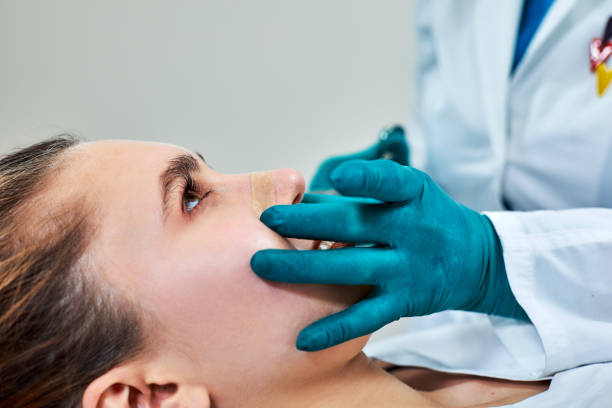The New Standard: Mental Wellness in Aesthetic Surgery
In Riyadh’s high-end aesthetic landscape, rhinoplasty has evolved from a purely physical transformation to a comprehensive process that considers the patient’s psychological well-being. Clinics across the capital are increasingly aware that successful surgical outcomes rely not just on technical precision, but also on the mental readiness of the individual undergoing the procedure. Whether it’s a young professional seeking profile balance or a bride-to-be wanting enhanced symmetry, the underlying motivations and emotional state play a pivotal role in the long-term satisfaction with rhinoplasty. Riyadh clinics now integrate psychological screening protocols and preoperative counseling to ensure each candidate is emotionally equipped for this deeply personal journey.
Understanding the Psychological Impact of Rhinoplasty
Rhinoplasty is one of the most emotionally charged cosmetic procedures, largely because the nose sits at the center of the face and defines personal identity. In Riyadh, where facial aesthetics are often closely linked to social presence, modesty, and self-confidence, the desire to alter one’s nose is rarely superficial. Patients may have lived with insecurities for years, influenced by cultural standards, digital filters, or comparisons to family members. The impact of this internal narrative can be significant. Without proper evaluation, a technically successful Rhinoplasty in Riyadh may still result in dissatisfaction if the patient had unrealistic expectations or unresolved emotional issues going into the procedure. This awareness is reshaping how clinics in Riyadh approach patient consultations.
The First Consultation: A Psychological Screening Begins
At many of Riyadh’s leading cosmetic surgery centers, the first rhinoplasty consultation serves as more than a clinical assessment. It is the entry point to understanding the patient’s motivation, mental clarity, and emotional stability. Surgeons and aesthetic consultants are trained to ask open-ended questions about why the patient wants the surgery, how long they’ve been considering it, and what they expect the outcome to achieve. In many cases, patients are asked about their social life, self-image, and even previous mental health experiences. These inquiries help identify red flags such as body dysmorphic disorder (BDD), depression, or pressure from external influences—factors that can negatively influence postoperative satisfaction.
Identifying Healthy Versus Unhealthy Motivations
Riyadh clinics increasingly emphasize the importance of discerning healthy motivations from those that may signal deeper emotional issues. A patient with a realistic desire to refine a dorsal hump for facial harmony is often seen as a good candidate. In contrast, a patient who believes a nose job will dramatically improve their career, marriage prospects, or social popularity may be operating from unrealistic or unhealthy expectations. Clinics take these distinctions seriously. Surgeons often delay or decline procedures if they sense the patient is not mentally prepared or emotionally grounded. Some clinics even refer patients to psychologists for evaluation before rescheduling the surgery, reinforcing the city’s evolving standard of ethical care.
The Role of Psychologists in Preoperative Screening
Some of Riyadh’s top-tier cosmetic centers now employ in-house psychologists or partner with mental health professionals as part of the rhinoplasty process. These specialists conduct brief evaluations to assess body image perceptions, expectation alignment, and emotional resilience. A standardized psychological readiness checklist may be used, which includes markers such as self-esteem levels, stress management, social support, and previous experience with cosmetic changes. Patients found to be struggling with anxiety, obsession over minor flaws, or recent traumatic events are gently counseled, and in some cases, advised to postpone surgery. This ensures that rhinoplasty is not used as an emotional escape or impulse decision.
Family Influence and Social Pressures in Riyadh
In Riyadh’s conservative and socially nuanced culture, family approval and societal expectations often play a major role in a patient’s decision to undergo rhinoplasty. Surgeons frequently encounter patients—especially women—who have received encouragement or disapproval from relatives regarding their appearance. Others feel pressured to meet certain beauty ideals popularized by social media or admired public figures. Clinics in Riyadh are trained to explore whether the motivation stems from intrinsic self-improvement or external validation. When a patient admits to wanting surgery solely to meet someone else’s standards, it prompts a deeper conversation. Surgeons guide the patient toward introspection, helping them evaluate whether their desire is authentic and sustainable.
Managing Expectations with Visual Simulations
Technology plays a powerful role in bridging the gap between patient desires and realistic outcomes. Riyadh clinics now routinely use 3D facial imaging and simulation software to show potential results before any incision is made. This tool is not just about aesthetics—it’s a psychological resource. When patients see realistic projections of post-rhinoplasty outcomes, they are often able to recalibrate overly ambitious or vague expectations. Surgeons can use the imagery to discuss limits, explain anatomical constraints, and manage emotional reactions in real time. For patients with tendencies toward perfectionism or idealization, this process helps establish a grounded, visual understanding of what surgery can and cannot accomplish.
Psychological Recovery After Surgery
The emotional journey doesn’t end with the operation. In fact, the postoperative period is one of the most psychologically sensitive stages of the rhinoplasty experience. Patients may go through a range of emotions—excitement, anxiety, doubt, or impatience—especially as swelling masks the final result during the early recovery phase. Riyadh clinics have recognized this and now include psychological touchpoints in follow-up visits. Surgeons are trained to offer reassurance, explain the healing timeline, and address concerns over symmetry or temporary imperfections. For patients showing signs of postoperative regret or dissatisfaction, counselors are available to provide short-term emotional support and prevent impulsive decisions such as early revision requests.
Recognizing and Addressing Body Dysmorphia
One of the key concerns in elective rhinoplasty is identifying patients who suffer from body dysmorphic disorder (BDD)—a condition where individuals fixate on perceived flaws that may be minor or non-existent. Riyadh clinics are now well-versed in spotting subtle signs of BDD, such as obsessively checking mirrors, bringing multiple edited selfies as references, or expressing extreme distress over small aesthetic deviations. While these patients may be highly articulate and eager for surgery, proceeding without psychological intervention can be harmful. Clinics typically refer such individuals to mental health professionals and often decline surgery until therapeutic progress is made. This protects both the patient’s well-being and the surgeon’s ethical responsibility.
Surgeon-Patient Alignment: A Predictor of Satisfaction
An often-overlooked but vital component of rhinoplasty success is the psychological rapport between patient and surgeon. In Riyadh, top aesthetic surgeons prioritize transparency, patience, and empathy during consultations. They do not rush the process or oversell results. Instead, they spend time building mutual understanding with the patient—discussing the limitations of anatomy, the importance of natural outcomes, and the reality of recovery. When patients feel heard and respected, they are far more likely to approach the surgery with realistic optimism. Clinics that foster this alignment consistently report higher satisfaction rates, lower revision rates, and more emotionally stable recoveries.
Rhinoplasty as a Journey of Self-Confidence, Not Perfection
Clinics across Riyadh are gradually reshaping the conversation around rhinoplasty from one of “fixing flaws” to one of personal empowerment and self-confidence. Patients are encouraged to view the procedure as a subtle refinement, not a total transformation. Surgeons and staff consistently emphasize that while rhinoplasty can enhance aesthetics, it cannot solve deeper issues like low self-worth or social anxiety. By setting these emotional boundaries clearly, clinics promote a healthier relationship between the patient and the cosmetic change they are seeking. As a result, rhinoplasty becomes less about chasing perfection and more about embracing a more confident, authentic self.
Conclusion: Emotional Intelligence at the Core of Riyadh’s Rhinoplasty Culture
In Riyadh’s sophisticated cosmetic scene, psychological readiness has become a cornerstone of ethical rhinoplasty. Clinics no longer see surgery as a purely physical task but as a transformative experience that must be guided by emotional intelligence, realistic expectations, and mental preparedness. By integrating psychological screening, offering professional counseling, and prioritizing patient-surgeon trust, Riyadh’s aesthetic clinics ensure that each rhinoplasty is not just a procedure—but a meaningful and mentally safe journey. In a city where beauty is both personal and cultural, this approach reflects a deeper respect for the whole individual behind the nose.

